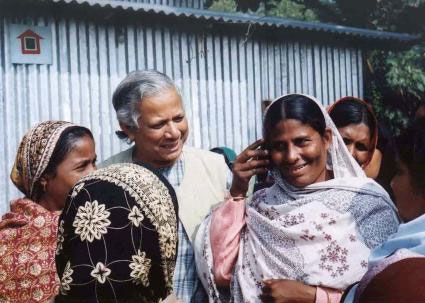
Muhammad Yunus is the managing director of Grameen Bank in Bangladesh and the pioneer of the practice of micro-credit lending. The idea of providing unsecured credit to the poorest began as an action research project at Chittagong University, which first provided a total of 27 U.S. dollars to forty-two people. In 2004, the bank disbursed close to five billion U.S. dollars to four million borrowers, ninety-six percent of them women. It tremendously helped the poor who had been neglected by traditional banks and suffered from the usury that was prevalent among the poorest in Bangladesh society.
Yunus’ unique path from an economist to a banker of the poor and eventually a Nobel Peace Prize winner has a great appeal for me in several respects.
The first remarkable thing about Yunus is his humanism. Born in a wealthy family, he got a PhD in Economics in the United States and became a professor of Economics at Middle Tennessee State University and later at Chittagong University in Bangladesh. In 1974, the year when Bangladesh was struck with extreme famine, he was faced with many people starving to death. He couldn’t help pondering about what economics could do for the people and thought, ‘In a situation where people are dying because they don’t have a small amount of food just to keep them alive, what use does economics have?’ After meeting a woman working day and night to earn only two cents and living in a house that looked like it could collapse at any time, he resigned from his post and jumped into reality to help people.
Second, Yunus pursued sustainable development among the poor through trusting them. He didn’t try to help them in a way of giving them money to buy food but rather by giving them a chance to recover from financial crisis through lending them some seed money. The only security he required from the borrowers was their will to succeed, a resolution for life. This proved to be much more successful than anyone expected; more than 90 percent of the people didn’t betray his trust and paid the money back. Through this experience of success, people recovered the sense of responsibility and independence, which led them to develop further.
Third, he tried hard to involve women in the economy. It was a truly pioneering thought, considering people currently claim that economically active women will be the solution of the labor shortage and the graying society. He succeeded to persuade women to participate in economic activities by granting the micro-credit to them and their average payment rate and customer ratio proved that women in general are more responsible and have great economic potential.
Forth, but most importantly, he actually went to the field of life to solve the poverty problem rather than inquiring and studying from a distant research lab. Once he got the result of the action research, he had the courage to apply it to real life to help the people of his country at the risk of what he possessed.
I read a great joke about economists in a book by Jeff Thredgold. U.S. President Harry S. Truman once said he wanted an economist who was one-handed. Why? Because his economic advisors would typically give him economic advice stating, "On the one hand…, and on the other hand...." I wondered why the economist who helped the poor with an economic idea of micro-credit won the Nobel Peace Prize instead of the Nobel Economics Prize. It is probably because Mohammad Yunus didn’t weigh the option he had “on his other hand,” but promptly acted to do what he believed was right, which distinguishes him from others. People can hardly get peace when their basic economic needs are not met, and it seems to be the reason why people use ‘peace’ as another name of the economics when it comes out of the classroom to practically help people.
By Choi YoungHoon
The writer, YoungHoon, is a first grader at Salesio High School and has won many prizes in English competitions.

